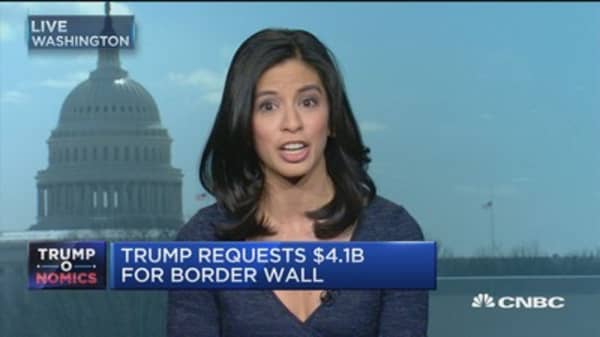Ted Atalla runs a small business selling LED lights called EcoVelocity based in Puebla, Mexico, about an hour and a half outside of the country's capital. He said he was born in Egypt and immigrated to the United States as a child. After many years in California as an American citizen, he moved to Mexico about five years ago and counts himself among Trump's supporters.
"I've been defending what we've been doing over there," he told CNBC. "I think it's a good thing."
But Atalla said he doesn't expect to win any work on the wall: His LED lights are made in China, and that's unlikely to go over well with the administration's mantra of buying and hiring American.
"I'm just watching [the contract] to see if I can offer anything to anybody when it comes," he said.
Customs and Border Patrol has extended the deadline for initial applications several times, saying "industry interest has been high." In its request for information, the agency described plans to build a concrete wall about 30 feet high that can prevent climbing and withstand tampering or damage.
"The intent of this procurement is to acquire and evaluate available wall prototypes and provide some initial construction of some wall segments, but is not intended as the vehicle for the procurement of the total wall solution for the border with Mexico," the contract listing from Customs and Border Patrol states.
Kenneth Madsen, an Ohio State geography professor, said the agency now appears open to both a concrete wall that would block pedestrians as well as other barriers — such as a fence that might only stop vehicles. And he pointed out that in Arizona, at least, physical barriers are already in place along nearly all passable portions of the state's border with Mexico.
Trump has repeatedly claimed that Mexico will pay for the wall, though the nation's leaders have adamantly rejected that proposal. In Washington, Democrats have already vowed to reject any spending bill that includes money for the wall.
"If Republicans insist on inserting poison pill riders … they will be shutting down the government and delivering a severe blow to our economy," Senate Minority Leader Chuck Schumer said in a statement.
Office of Management and Budget Director Mick Mulvaney said the administration is asking for $1.5 billion this fiscal year and $2.6 billion in fiscal 2018. Mulvaney said the funds would be used to create pilot projects that test different types of barriers in several locations along the Mexican border.
"This is a hard-power budget. That was done intentionally," Mulvaney told reporters during a background call Wednesday. "The president wants to send a message to our allies and to our potential adversaries."





